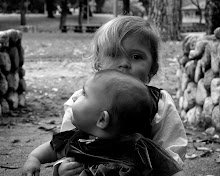Today it dawned on me that we don't give our children enough credit where it is rightfully due. It seems second-nature to most of us to try and instruct our children in the ways of politeness and compassion. "Say thank you," "say sorry," "give her a hug", "say excuse me," etc. I hold the not-so-popular opinion that this actually does more harm than good, since forcing a child to do these things makes it compulsory and externally motivated, which, in turn, makes it less likely that they will do such things on their own and be sincere in their intent. My goal is to encourage my children to be internally motivated and genuinely compassionate.
Of course, as we all know, at two years old, most children are distinctly self-centered and not overly concerned with the emotions of others, having not yet completely even realized that others have genuine feelings or that their own actions may affect the feelings of others. What this means is that I am destined to have painfully rude, selfish, and, at times, downright mean children until they reach the age when they are developmentally capable of true empathy. I accept this. Others probably do not (especially those with children who have to play with and be bullied by my two-year-old), but in allowing their children to play with mine, they are helping him to develop that altruism that should be rearing its pretty little head any day now...
But today, I was reminded that children love others despite what we may inadvertently teach them. Leonidas was playing with his two cousins, ages 3 and 4, and a neighbor kid, age 5. They were playing outside on this lovely, bright, sunny day, and spraying each other with water from the hose. Persephine, his four-year-old cousin, became obviously (and as dramatically as her four-year-old self could muster) distraught, grabbed her towel, wrapped it around her, and sat down on the curb, back to the other children, head hanging down, staring into the gutter in a very lonely sort of way. I watched from across the street, silent and observing. After a minute, Leonidas saw her sitting there. He looked at her for a few minutes, unsure of the situation, trying to figure it out. Then he walked over cautiously, sat down on the curb next to her, put his hand on her back, tilted his head, and, in a very concerned yet quiet tone of voice, said, "Uh wrong, Seh-she?" (Translation: "What's wrong, Persephine?") She looked at him, sighed heavily, and said, "I'm cold, and they won't stop squirting me," then put her head back down into her hands. Leonidas contemplated this for a moment, then looked down into the gutter, sighed, and said, "Yeah." The two of them sat there for a few minutes, just looking into the gutter and feeling bad, one for the other. Leonidas then stood up, said, "Wa pway, Seh-she?" ("Wanna play, Persephine?") She shook her head, "no," and he went on his way, playing with the others. Not a tremendous exchange, but a meaningful one. I have never told him how to react to others when they are sad, or told him to "ask what's wrong," or "say you're sorry." But he knew. At 23 months old, he knew she was hurting, and he knew what to do - probably even better than many adults would have. He didn't try to fix it (he hasn't been taught to do that). He just listened and empathized. I could learn a lot from him. I wish more people would learn to do that. Maybe what we try to teach actually gets in the way of that natural reaction. Maybe kids learn more from observing others than from being "taught." Maybe they don't have to be taught at all - they just have to learn. I know one thing: I am proud of my son - when he is mean and when he is kind - not because of what I have taught him, but because of what he has learned, and because in spite of all my efforts to "parent", he still manages to thrive!
Thursday, March 10, 2011
Subscribe to:
Post Comments (Atom)





No comments:
Post a Comment